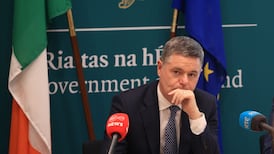US supreme court justices on Wednesday appeared sceptical of Donald Trump’s use of emergency powers to impose a series of tariffs in a closely watched hearing in Washington.
The court, which is split 6-3 between conservative and liberal justices, challenged the government’s use of the International Emergency Economic Powers Act (IEEPA) to impose global levies – raising questions over whether a key pillar of Mr Trump’s second presidency will be struck down by the country’s top court.
The case was brought by groups of US businesses, who were joined by 12 US states, that argued they had been harmed by Mr Trump’s tariffs.
Losing it would complicate his aggressive trade policy, threatening the “reciprocal” tariffs that are the centrepiece of his second-term trade war, as well as levies placed on China, Canada and Mexico to retaliate for their alleged involvement in trading the deadly opioid fentanyl.
READ MORE
A loss would also call into question more than $50 billion in extra tariff revenue that the government has collected in 2025, a windfall that has soothed investors nervous about US borrowing levels.
Mr Trump has framed the case as existential. It is “literally, LIFE OR DEATH for our Country”, he wrote in a social media post on Tuesday. “With a Victory, we have tremendous, but fair, Financial and National Security. Without it, we are virtually defenceless against other Countries who have, for years, taken advantage of us.”
John Sauer, the US solicitor-general, told the court the president had determined that “our exploding trade deficits have brought us to the brink of an economic and national security catastrophe”.
Treasury secretary Scott Bessent, who attended the court in person, said he was optimistic about the hearing. “It went very well. I think the solicitor-general has made a very powerful case,” he told reporters.
Asked whether tariff revenue would be refunded if the government loses the case, Mr Bessent told Fox Business: “We will cross that bridge if we come to it, but I’m confident we won’t have to.”
The US was in an “economic emergency”, he said, adding that “real goal here is to rebalance our trading relationships and bring home manufacturing”.
Some members of the court’s conservative wing, including justices Samuel Alito and Brett Kavanaugh, appeared open to the government’s arguments.
But other conservative members challenged Mr Trump’s use of IEEPA, which no other president has invoked to impose tariffs. The policy’s “vehicle is imposition of taxes on Americans, and that has always been the core power of Congress”, said chief justice John Roberts.
Justice Neil Gorsuch cautioned against “a one-way ratchet toward the gradual but continual accretion of power in the executive branch and away from the people’s elected representatives”.
He also warned that once Congress delegated its powers to presidents, “in the real world, it can never get that power back ... What president is ever going to give that power back?”
Amy Coney Barrett, the conservative justice who has been attacked by Trump supporters for sometimes siding against the government in her decisions, also questioned the basis of the tariffs.
“Is it your contention that every country needed to be tariffed because of threats to the defence and industrial base? I mean, Spain? France? I could see it with some countries, but explain to me why as many countries needed to be subject to the reciprocal tariff policy as are,” she asked Mr Sauer.
The top court has already weighed in on several Trump policies – including allowing deportations to third countries. But this is the first time it will squarely examine the legal basis of a critical part of the president’s sprawling second-term agenda.
The court’s liberal wing also raised doubts around the tariffs’ legality.
Justice Elena Kagan questioned Mr Trump’s claims that the US is facing a national emergency, which have underpinned many of his policies and which the government argues cannot be reviewed.
“It turns out we’re in emergencies, everything all the time about, like, half the world,” she said.
Neal Katyal, the lawyer representing the businesses that sued the government, told the court it was “simply implausible that, in enacting IEEPA, Congress handed the president the power to overhaul the entire tariff system and the US economy in the process, allowing him to set and reset tariffs on any and every product, from any and every country, at any and all times”.
While the administration has other tools to impose tariffs, none can be deployed as quickly and simply as IEEPA, raising the possibility of a short delay to the collection of levies should the justices strike down its case. – Copyright The Financial Times Limited 2025














